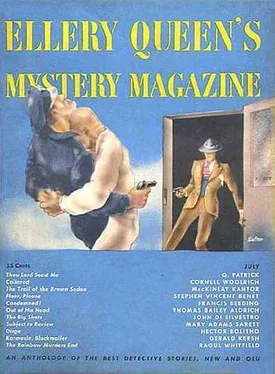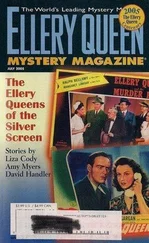Thomas Aldrich - Ellery Queen's Mystery Magazine, Vol. 14, No. 68, July 1949
Здесь есть возможность читать онлайн «Thomas Aldrich - Ellery Queen's Mystery Magazine, Vol. 14, No. 68, July 1949» весь текст электронной книги совершенно бесплатно (целиком полную версию без сокращений). В некоторых случаях можно слушать аудио, скачать через торрент в формате fb2 и присутствует краткое содержание. Город: New York, Год выпуска: 1949, Издательство: The American Mercury, Жанр: Классический детектив, на английском языке. Описание произведения, (предисловие) а так же отзывы посетителей доступны на портале библиотеки ЛибКат.
- Название:Ellery Queen's Mystery Magazine, Vol. 14, No. 68, July 1949
- Автор:
- Издательство:The American Mercury
- Жанр:
- Год:1949
- Город:New York
- ISBN:нет данных
- Рейтинг книги:5 / 5. Голосов: 1
-
Избранное:Добавить в избранное
- Отзывы:
-
Ваша оценка:
- 100
- 1
- 2
- 3
- 4
- 5
Ellery Queen's Mystery Magazine, Vol. 14, No. 68, July 1949: краткое содержание, описание и аннотация
Предлагаем к чтению аннотацию, описание, краткое содержание или предисловие (зависит от того, что написал сам автор книги «Ellery Queen's Mystery Magazine, Vol. 14, No. 68, July 1949»). Если вы не нашли необходимую информацию о книге — напишите в комментариях, мы постараемся отыскать её.
Ellery Queen's Mystery Magazine, Vol. 14, No. 68, July 1949 — читать онлайн бесплатно полную книгу (весь текст) целиком
Ниже представлен текст книги, разбитый по страницам. Система сохранения места последней прочитанной страницы, позволяет с удобством читать онлайн бесплатно книгу «Ellery Queen's Mystery Magazine, Vol. 14, No. 68, July 1949», без необходимости каждый раз заново искать на чём Вы остановились. Поставьте закладку, и сможете в любой момент перейти на страницу, на которой закончили чтение.
Интервал:
Закладка:
But slowly, daringly, the thought of Rose Henderson came to comfort him. Romantic images stole through him as he tossed against the pillows. Miss Henderson looking up from her desk, showing her fine white teeth in a smile of pleasure at his return next day to the office. Miss Henderson’s shy acknowledgement as he thanked her for her letter. Miss Henderson, perhaps, across the table from him in a little restaurant. “Oh, Mr. Loomis, all these years I’ve waited, but I never thought ...”
Why not? Why shouldn’t it happen? Hadn’t the dream of the santonin bottle come true? These new fantasies explored the future with a delicious sense of certainty.
Mr. Loomis crept out of bed and fumbled the photograph from his wallet. He did not need to turn on the gas to remember every detail of that childish body, those wistful eyes and the solemn face absorbed with the candy rock.
He put the photograph under his pillow and drifted into a soothing sleep.
At precisely a quarter to two the next afternoon Mr. Loomis passed the open door of Mr. Tinker’s office and saw, as he had hoped, that Miss Henderson was standing by the desk, sorting papers. He stepped across the threshold and she glanced up.
“Oh, Mr. Loomis, I didn’t see you.”
Mr. Loomis wasn’t seeing her, either. He was seeing something which he had built out of dreams, a never-never-land creature at once a little bare-legged girl and the mother of other little bare-legged girls yet to come.
“I wish to thank you for your letter of sympathy, Miss Henderson. I deeply appreciated it.”
Miss Henderson flushed a heavy pink. “Oh, of course I had to write.” It was all beginning in a fashion so similar to Mr. Loomis’ imaginary dialogue that he drifted even further into unreality. He was not the recently widowed cashier and she was not Miss Rose K. Henderson, Mother’s Service Manager. They were characters in a debonair romance.
“I was wondering, Miss Henderson, if you would do me the great pleasure j of dining with me one night.”
Miss Henderson’s flush was an unbecoming carmine now. “Well, j I mean, I am sure it would be very nice. But I live with my mother. She’s old and not very strong. I always...”
“A little French restaurant,” continued Mr. Loomis, his mating gallantry undisturbed. “In Soho perhaps. A quiet little dinner. Wine.”
Miss Henderson patted nervously at the heron’s nest above her thick spectacles. “Wine? I never touch wine, Mr. Loomis. And, really, I mean, isn’t it rather premature? So soon, I mean, after your wife...”
“I have kept this,” confided Mr. Loomis, producing the photograph from his wallet. “A dear little girl with bare legs.”
“Really!” Miss Henderson snatched the photograph from him. “Really, Mr. Loomis!”
The tone of her voice edged into Mr. Loomis’ reverie. Dimly he was aware that the dialogue was not progressing as it should. He blinked and, actually looking at her for the first time, saw the awkward flush, the eyes, prudish and outraged behind the opaque lenses, watching him as if suspicious of his sobriety.
“Miss Henderson, I was not suggesting anything...”
“Really, Mr. Loomis, this is most embarrassing. I think it would be better if we forgot the whole episode.”
There they were. The words were spoken. They could not be taken back. Mr. Loomis accepted their inevitability, and with that clarity which now seemed so often to plague him, he realized that this last dream had also been meaningless. It was too late to search for the little girl of the photograph in the barren middle-aged spinster which was the Reality of Rose K. Henderson — thirty years too late.
“Yes, Miss Henderson,” he said meekly, much as in the old days he had said: “Yes, Mabel.”
Still icily clear in his mind, he returned to his own office and sat down behind his open ledger. Dinah was gone; little Rosie Henderson was only a faded photograph. For the first time he realized that in losing his wife he had lost the only thing he had ever really had. For all her acrimonies, her scoldings, Mabel had been a frame for existence. Without the frame was blankness. Perhaps, if he had killed her, there might have been some perverse sense of achievement to support him. But he had only tried to kill her, failed, and lost her anyway.
Mr. Loomis made an effort to reach some communion with the ledger entries which had once been his friends. But even they eluded him and he began gropingly to see that his love of his work at Tinker and Smythe had been inextricably tied to his dread of homegoing. Now that dread was removed and replaced by — nothing.
Mr. Loomis struggled with the ledger. For hours, it seemed, he poured over a single column until the precise little pounds, shillings, and pence danced before his eyes like midges.
It was no good. He closed the book and carried it automatically to the safe. He swung open the door and put the ledger in its appointed place. As he did so, his eyes fell on the poison shelf — on the little green bottle of santonin crystals.
He knew at once what to do. It was as if the next step, which had never figured in his day dreams at all, was something he had rehearsed a thousand times. He took down the bottle, shook crystals into his palm, and replaced the bottle on its shelf. Carefully he closed the safe and went down the passage to the washroom. The crystals dissolved quickly in the paper cup of water. Mr. Loomis raised the cup to his lips and drank.
As he felt the bitter taste in his mouth, a tingle almost of relief passed through him. Perhaps, vaguely, he realized that here at last was an enterprise at which he could not fail.
After he had dropped the empty cup into the waste basket, Mr. Loomis returned to his own office and sat down to wait. He was without feelings now. He had read somewhere that the first symptom of santonin poisoning was a visual illusion in which everything seemed tinged with yellow.
On the wall in front of him was a calendar. He had hardly noticed it before. A charming little thatched cottage nestled on the bank of a millpond. A small boy — or was it a small girl? — sat fishing on the flowery brink of the water. Evening light lulled the whole scene in a placid golden glow...
Mr. Loomis was perfectly aware of the fact that someone had entered the room. He even knew it was Miss Griffin, one of the junior typists, and when she said: “There’s a gentleman to see you. Shall I send him in?” he heard her and nodded his assent. Both Miss Griffin and the office were beautiful, bathed in the golden sunset of the calendar.
When Miss Griffin’s sparse figure was replaced by that of a large, burly man, Mr. Loomis immediately recognized Al Potts. He didn’t wonder why Al should be standing there in his office. It only surprised him mildly that Dinah’s stepfather-to-be should shine with such a heavenly light.
“Well, Bloomers, hope you don’t mind me barging in this way.”
Mr. Loomis heard the words distinctly and once again gave his regal nod.
“I wanted to catch you before you got home. There’s been a kind of to-do and I’ve come to ask a favor.” Al was shifting his weight from one large foot to the other — a dancing bear in a world of gold.
“It’s this way, Bloomers. Mamie and me broke the news to Dinah today and she’s taken it real bad. Been carrying on all afternoon, bawling that she won’t go to beastly old Australia, that she won’t ever leave her Daddy Bloomers.”
Mr. Loomis was light as a piece of paper, floating up, up. But he listened and happiness floated with him.
“Can’t do a thing with her,” continued Al Potts, “and while she was bawling, Mamie and me got to thinking. To begin with life’s going to be pretty rugged; no time, no place really for a kid. So we was wondering, seeing Dinah’s so head over heels in love with her Daddy Bloomers, we was wondering if you’d let us leave her with you, say for a year — till we get settled...
Читать дальшеИнтервал:
Закладка:
Похожие книги на «Ellery Queen's Mystery Magazine, Vol. 14, No. 68, July 1949»
Представляем Вашему вниманию похожие книги на «Ellery Queen's Mystery Magazine, Vol. 14, No. 68, July 1949» списком для выбора. Мы отобрали схожую по названию и смыслу литературу в надежде предоставить читателям больше вариантов отыскать новые, интересные, ещё непрочитанные произведения.
Обсуждение, отзывы о книге «Ellery Queen's Mystery Magazine, Vol. 14, No. 68, July 1949» и просто собственные мнения читателей. Оставьте ваши комментарии, напишите, что Вы думаете о произведении, его смысле или главных героях. Укажите что конкретно понравилось, а что нет, и почему Вы так считаете.












